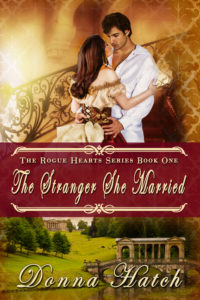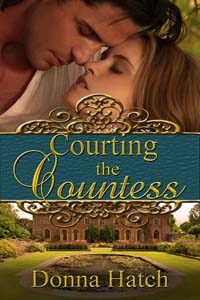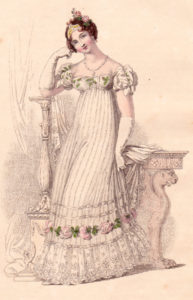 The idea that we’d let our parents or guardians arrange our marriages leaves the modern day man and woman laughing–or possibly cringing. Yet this was a common custom throughout history in nearly every country of the world. I’m sure a few of those marriages ended up as love matches, while most grew into merely a mutual amiability born of a determination to make the most of a difficult situation. However, many such unions were supremely miserable.
The idea that we’d let our parents or guardians arrange our marriages leaves the modern day man and woman laughing–or possibly cringing. Yet this was a common custom throughout history in nearly every country of the world. I’m sure a few of those marriages ended up as love matches, while most grew into merely a mutual amiability born of a determination to make the most of a difficult situation. However, many such unions were supremely miserable.
Such arrangements are a favorite trope for the romance reader and author alike, inspiring countless historical romance novels about love springing from an arranged marriage. Such was the case for my very first published Regency Historical Romance novel, The Stranger She Married and again in Courting the Countess.
Which begs the question; why were arranged marriages so common in history?
I can’t speak for other countries, but in England, the institution of marriage was a union of rank and property rather than of love. Though many popular ballads, poems, and plays of the era praised true love, in reality, practicability ruled more heavily than affairs of the heart. During the Regency era, all women, even ladies of the gentry and aristocracy, possessed very little independence. They were, in essence, the property of their parents until they married, at which time they became the property of their husbands. Therefore, parents cautiously settled their daughters in what they deemed were ‘good matches.’
They valued security over love because in a time when divorce was almost unheard of–and viewed as scandalous–marriage was a lifetime commitment, for better or worse. Parents searched for men who would keep their daughter fed and cared for. They could only hope that love–or at the very least, regard–would bloom later. Men understood that marriage was a duty in order to produce heirs. Love itself, if it came, was a bonus. In fact, most men had mistresses because marriage wasn’t usually a romantic relationship–it was more a business relationship.
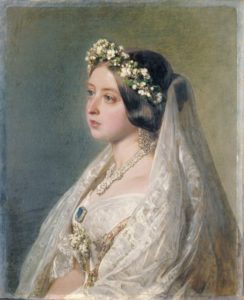 The Victorian era solidified the idea of romantic love and marriage among the upper classes (Think of Queen Victoria; hers was a famous love match). Prior to that, while it did happen and people dreamed of it, and it happened in all of Austen’s novels, it really wasn’t what everyone expected. Love sometimes happened with the wrong person which ruined families financially.
The Victorian era solidified the idea of romantic love and marriage among the upper classes (Think of Queen Victoria; hers was a famous love match). Prior to that, while it did happen and people dreamed of it, and it happened in all of Austen’s novels, it really wasn’t what everyone expected. Love sometimes happened with the wrong person which ruined families financially.
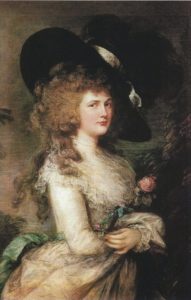
One such example was the 1774 marriage between the 17-year-old daughter of the Earl of Spencer, Georgiana, and the Duke of Devonshire, a 26-year-old gentleman of supreme wealth, power, and influence. On the surface, the union must have appeared an excellent match. The Duke desired a young wife of high rank to provide him with heirs. For Georgiana, her status would be elevated to the coveted rank of duchess. According to reports, the young couple met a few times, all well chaperoned, before they wed.
Reportedly, Georgiana tried to love her untouchable husband, but he returned to the arms of his mistress. Their infamously unhappy marriage proved that money and status could not guarantee love or happiness.
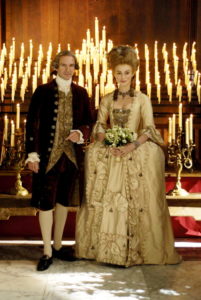
The true story inspired Hollywood’s 2008 film The Duchess. Isn’t the wedding gown costume worn by actress Keira Knightly (right) gorgeous? But I digress.
But not all marriages were so unhappy. Amanda Vickery, in her book A Gentleman’s Daughter contends that many people married for affection; that it was, in fact, more common than marrying for rank or wealth. I hope that is true! Still, arranged marriages were common, often with the couple only having met a few times, or not at all, prior to the wedding.
In my stories, the characters all fall in love and find great joy together. After all, I’m all about the happily ever after 🙂
Desperate to save her family from debtor’s prison, Alicia vows to marry the first wealthy man to propose. Her choices? A scarred cripple and a rake with a deadly secret.
When the only way to prevent a duel between her brother and the man she loves is to marry his brother, Elizabeth loses her dreams of love and happiness…unless she can learn to love the stuffy earl who might be trying to court her in his own, gruff way.

